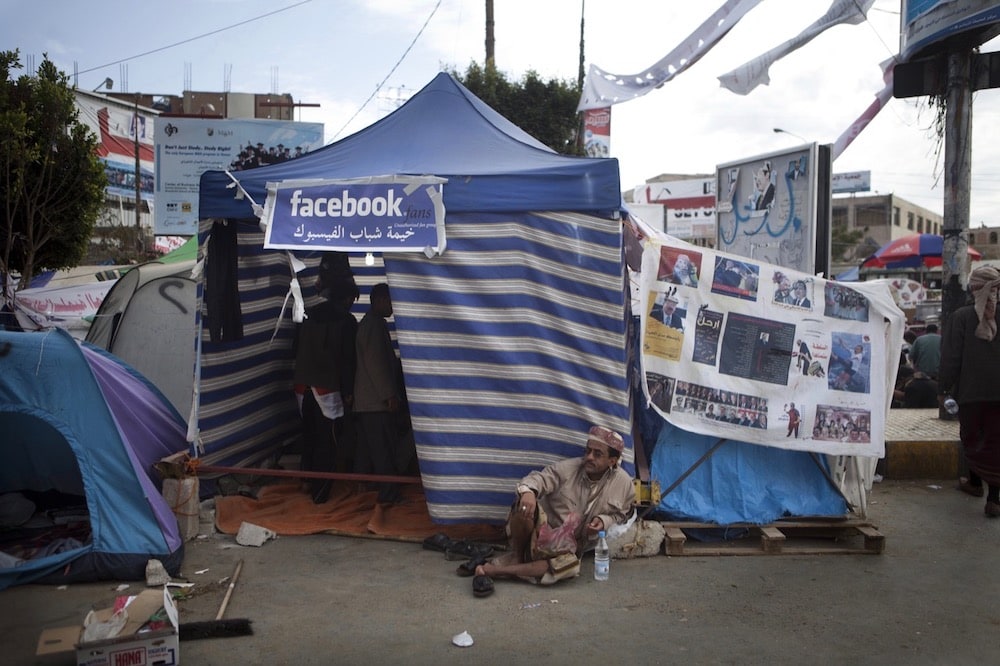Facebook algorithm change hits MENA independent media audiences hard, reports Global Voices.
This statement was originally published on globalvoices.org on 23 September 2023.
Google and Meta, commonly referred to as the duopoly of the internet, dominate online access to information. In a recent showdown with authorities, these tech giants are set to block news on their networks in Canada in response to a new law mandating payment to news publishers.
The decision coincides with broader challenges confronting the media industry worldwide, such as dwindling advertising revenues and heavy reliance on social networks for readership.
In the Middle East and North Africa (MENA) region for example, Facebook’s evolving relationship with the news industry, algorithm adjustments, and their repercussions on local media outlets add complexity to the landscape of news dissemination, particularly affecting smaller, independent publishers.
Facebook uncertain relationship with the news industry
Meta, the parent company of Facebook and Instagram, has faced numerous criticisms for disseminating fake news and hate speech. The recent withdrawal from news is part of a broader shift towards prioritizing user-generated content. However, this is not the first time Facebook has vacillated over the role news should play on its platform. After going as far as collaborating closely with the news industry, injecting millions in funding, and providing media training through its Journalism Project, Facebook backpedaled.
In 2018, under public and regulatory pressure, Mark Zuckerberg first announced they would be “making a major change to how we build Facebook,” resulting in users seeing less public content, such as posts from businesses, brands, and media outlets. Over the years, the platform has been notoriously opaque about when and how it changes its algorithm, the set of rules that defines what posts are seen in what used to be called the newsfeed, its central feature section. It was renamed “Feed” in February 2022.
Echobox, a social media management company, reported that the most recent significant Facebook algorithm change occurred in February 2023, and accelerated in May 2023. This change resulted in content from publisher pages nearly disappearing from user feeds. This sudden shift significantly reduced traffic to media websites, disproportionately affecting audiences and publishers in the Global South, including the MENA region. These regions heavily rely on social media referrals for news access.
Facebook’s disproportionate influence in the MENA region
Social media are widely popular in the region. Despite the rise of new platforms like TikTok, Instagram, and Snapchat, Facebook remains a pivotal force in the MENA region. For many, it represents the internet itself. Arabic is the third most used language on the platform. In a MENA survey conducted in 2022, around 72 percent of respondents reported daily Facebook usage. Notably, Libya (100 percent), the UAE (93 percent) and Qatar (90 percent) have exceptionally high Facebook reach relative to their population. Egypt, Morocco, and Algeria also rank in the top 10 countries for the fastest-growing Facebook user base.
A more vulnerable media landscape
Unlike their Western peers in more enabling environments, media outlets in the MENA region have long struggled with challenges such as digitalization, limited resources, and political repression. These unique obstacles have rendered their reporting and survival fragile. In an increasingly frail digital news landscape, publishers find themselves at the mercy of third-party platforms, where algorithmic changes beyond their control have led to news shaping and, in some cases, layoffs or even business collapse.
Kamel, the founder of Raimh Post, an online local news outlet covering a remote marginalized region in Yemen, described to Global Voices the abrupt consequences of these shifts:
“Overnight with no pre-warning, insights and preparation our content was not shown any more on Facebook, our main channel of distribution. We have lost nearly 80 percent of our audience who used to come from Facebook to our website. It’s very frustrating. We are in crisis as we have lost our audience and business.”
Pay or you will not be seen by your audience
In a classic commercial play, Facebook initially enabled organic reach for news content, making itself indispensable, before imposing a price tag for visibility. News content that once appeared organically in user’s feeds, must now be sponsored for a chance to be seen. Additionally, posts with external links are downgraded as Facebook aims to keep users within its platform.
This shift has frustrated users like Hassen, a young unemployed Algerian, who reported to Global Voices, “Facebook should ask us what we want to see. I used to follow updates from the news and international organizations who post opportunities for jobs, training, and learnings resources, etc. I noticed that they don’t appear on my feed anymore. I only see posts from friends which are often not very interesting or useful.”
While larger websites, often funded by states or political entities, have more capacity to adapt and pay to promote their content, the impact is more dramatic for small independent publishers due to their limited resources.
Wael Sharhah, the founder of Awafi, a non-profit newsroom in Yemen dedicated to public health education, criticized Facebook’s aggressive push to charge for content that was once freely accessible. He told Global Voices:
“It is very aggressive and irresponsible of Facebook to push us now to pay for what used to be free. We are creating the social value of the platform by empowering the public with information. While we were already struggling, it is more difficult in our region to generate revenues and report independently.”
The TikTok-ization of Facebook
Since the internet’s inception, written content has been the primary medium for conveying information. According to the Reuters Digital News Report 2023, the majority of online users worldwide still prefer reading the news over watching or listening to it as it offers faster and more convenient access to information.
However, the habits of younger generations, who grew up with social media and smartphones enabling easy video creation and sharing, have evolved. These social natives now consume a significantly higher number of short videos, often presented by influencers rather than traditional journalists. This shift has propelled the success of more visually-oriented social networks like YouTube, Instagram, and, more recently, TikTok, in contrast to more text-focused networks such as Facebook or Twitter.
In response, Facebook and Instagram have aggressively promoted short-format video content, modifying their algorithms to prioritize video over text-based content. The downplay of text articles has badly impacted publishers. Many journalists critique the value of short videos, expressing concerns that TikTok-ification of news trivializes important issues.
Mabrouka Khedir, the head of Cosmos Media, a Tunisian digital media outlet focusing on the environment, emphasized the challenges of providing context and explaining complex stories in short videos. She said to Global Voices “Written news helps convey greater complexity and detail. We are already stretched, and it takes much more resources to create a good video compared to text.”
The deeper issue: Supporting a free press in challenging contexts
As advertising revenue and audience increasingly shifted toward social media platforms, numerous local media are struggling to survive, some have already disappeared. In the MENA’s highly repressive environment, there is a risk of regions turning into “news desert,” where there is no free, independent information, and human rights violations go unreported.
Most MENA countries are languishing at the lower end of the RSF’s global freedom of expression index. Despite their predominantly youthful population and the eagerness of women to participate, there is a dearth of local platforms that can amplify their voices and contribute to shaping public policies.
The ongoing debate about the responsibility of social media platforms and the media industry highlights a far deeper global issue. Societies all over the world, particularly in contexts of conflict, are grappling with the fundamental importance of safeguarding press freedom. Press freedom is the foundation of democracy, peace, and development.



